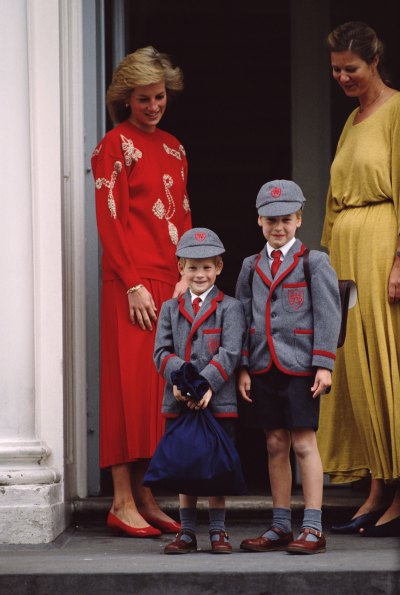September 7th is here, and it marks the beginning of the British school year. Across the UK, millions of parents are clutching tissues as they send their little ones off to their first day of school. It's a bittersweet moment as tiny babies grow up and step through school gates with confidence. At Kensington Palace, the Duke and Duchess of Cambridge are no exception. Their eldest son, Prince George, is starting his education at Thomas’s Battersea in London, while Prince William and Kate Middleton wave him off.
Though Kate was expected to make an appearance after announcing her third pregnancy earlier this week, her severe morning sickness kept her from attending the first day. This absence likely reminds royal watchers of Prince William's own first day at Ludgrove School. But not all members of the royal family followed the same educational path—some were homeschooled, others attended boarding schools, and a few even took gap years. Let's take a closer look at the schooling history of the British monarchy and how it shaped their lives.
Prince William: From Nursery to University
Who can forget that iconic moment in 1985 when a shy, three-year-old Prince William walked hesitantly into Mrs. Mynor’s Nursery School in Notting Hill? Young William clung to his mother, Princess Diana's hand, before letting out a shy wave. As he grew older, William attended Wetherby School, a pre-preparatory institution, before moving on to the prestigious Ludgrove Prep School in Berkshire, England. There, he gained confidence and thrived academically and socially.
Read also:Camilla Duchess Of Cornwall The Quiet Force Behind Prince William And Harry

Princes William and Harry before school in 1989. (Photo Credit: Getty Images)
During his high school years, William attended Eton College, an exclusive boarding school for boys. He focused on biology, history, and geography, breaking away from the traditional Windsor House route of attending the co-ed school Gordonstoun in Scotland. At Eton, he excelled in sports like water polo and football. For his A-level exams, William earned a C in biology, a B in the history of art, and an A in geography. Reflecting on his school years, he admitted, "I didn’t really like school." Despite this, William completed his education at the University of St Andrews, where he met his future wife and graduated with a Masters of Arts degree in geography. Quite fitting for a future king!
Prince Harry: A Different Path
Prince Harry has always been open about his struggles with academics, especially during his early years. Like his brother, Harry attended nursery school at Jane Mynors’ and the pre-preparatory Wetherby School in London. He then moved on to Ludgrove and Eton. At Eton, Harry found his passion in sports, particularly rugby union and polo. He scored a B in art and a D in geography for his A-levels. Harry humorously admitted, "Exams were always a nightmare, but anything like kicking a ball around or playing PlayStation—or flying—I do generally find a little bit easier than walking, sometimes." After completing his education, Harry took a gap year in Australia and Africa, eventually joining the Royal Military Academy Sandhurst, where he became an Apache pilot—a highly challenging role requiring immense skill.
Kate Middleton: From Private School to St Andrews
Before becoming the Duchess of Cambridge, Kate Middleton was just an ordinary girl growing up in the English countryside. Her parents sent her to the local private school, St Andrew’s in Berkshire, England. Kate continued her education at Marlborough College in Wiltshire, where she boarded, before attending the University of St Andrews—a decision that would change her life forever. But Kate wasn't just there to meet princes; the bright student graduated with a degree in art history. Her time at university was pivotal in shaping her into the confident and intelligent woman we know today.
Queen Elizabeth and Prince Philip: A Royal Education
Queen Elizabeth and her sister, Princess Margaret, were homeschooled by the finest tutors money could buy. Their education covered everything from constitutional history to French and math, preparing them for their future roles. Though she has never officially taken an exam, Queen Elizabeth is known for her sharp intellect and ability to hold her own with world leaders. Historian Kate Williams noted in her book Young Elizabeth, "The Queen’s father had disliked school, and her mother thought it was more important to have fun." Despite this unconventional approach, Elizabeth joined the Auxiliary Territorial Service during World War II, training as a mechanic—a bold move that broke royal protocol. This experience paved the way for her to become one of the most respected monarchs in history.



